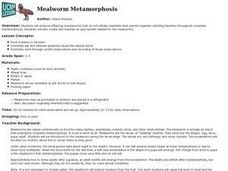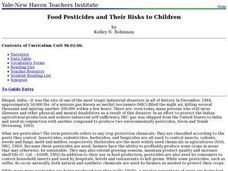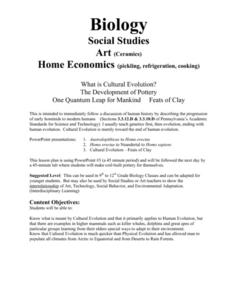Curated OER
Taking Apart Owl Pellets
Students dissect an owl pellet. In this rodent and bone structure lesson plan, students work in groups to take apart an owl pellet. Students separate all the tiny bones from the fur and use the bones to reconstruct the rodent on a tag...
Curated OER
Identifying Trophic Levels Through the Dissection of Owl Pellets
Students discover a part of the natural food chain through the dissection of owl pellets. They compare, identify, and record rodent skeletal parts they find in the pellet to skeletal diagrams and try to reconstruct a skeleton from the...
Curated OER
Owl Pellets
Pupils dissect owl pellets, and compare, identify and record rodent skeletal parts. They compare rodent skeletal diagrams to human skeletal diagrams.
Curated OER
TAKING APART OWL PELLETS
Students dissect and owl pellet and then reconstruct small rodents on a presentation board using a textbook picture as a guide.
Curated OER
Owl Pellets
Students utilize owl pellets to explain part of the natural food chain, and the skeletal system. They construct a rodent skeleton from the skeletal parts foundin the pellet.
Curated OER
Dissecting Owl Pellets
Pupils examine owl pellets and what their diet consisted of, specifically rodents. This furthers their understanding of simple food chains as well as bone structure and identification.
Curated OER
Identifying trophic levels and the skeletal system through Owl Pellets
Young scholars identify a food chain sequence. They compare, identify, and record the rodent skeletal parts to a rodent skeletal diagram. Students construct a rodent skeleton from the skeletal parts found in the pellet. They are given...
Curated OER
Owls: Top of a Food Chain
Although written for middle schoolers, there is no reason that a 3rd, 4th, or 5th grader could not also learn about food chains through the dissection of owl pellets. After you introduce the topic, learners complete an owl research...
University of Kentucky
The Great Spider Debate
Poor, misunderstood spiders! They are feared, disrespected, and detested by many people, yet they do so many positive things. A great addition to any insect unit, learn about some of the more common spiders, while hopefully dispelling...
Curated OER
Anne Frank: The Island of the Skog
Students read and discuss The Island of the Skog by Steven Kellogg and examine the illustrations, keep a "discrimination log," and write about one example of discrimination and how they could have intervened to stop it.
Curated OER
Mealworm Metamorphosis
Students observe offspring (mealworms) that do not initially resemble their parent organism (darkling beetles) throughout complete metamorphosis. They also create and maintain an appropriate habitat for the mealworms.
Curated OER
Owl Pellets
Students examine and discuss what owls eat and how their digestive system works. They dissect owl pellets, identify the bones found, and analyze and record the results.
Curated OER
Australian Mammals: Evolutionary Development as a Result of Geographic Isolation
Young scholars comprehend the difference between monotremes, marsupials, and placental mammals. They are able to compare and contrast these organisms (Australian mammals) with other mammals. Students are able to identify Australian...
Curated OER
Beaver Ecology
Students investigate beaver adaptations, life cycle, and the effects of beaver behavior on ecosystems. They compare and contrast how beavers influence the ecology of both forest and aquatic ecosystems.
Curated OER
Dissecting Owl Pellets
Students dissect owl pellets. In this dissecting owl pellets lesson, students discuss birds of prey and make predictions about what they may find during the investigation. Students tease out skull and bones and try to make a complete...
Curated OER
The Barn Owl Pellet
Seventh graders examine the factors that affect the number and types of organisms that an ecosystem can support. In this ecosystem lesson students study the barn owl and where it is on the food chain, then dissect an owl pellet.
Curated OER
EPA Pesticides Reduction
Young scholars examine the effects of pesticides on the environment and bugs. They answer questions as an assessment.
Curated OER
Hooway for Wodney Wat
Students examine speech difficulties by reading a children's book in class. In this children's literature lesson, students read the story Hooway for Wodney the Wat, and analyze the characters, story and the bullying that takes place....
Curated OER
Determination of Phylogenetic Relationships Using Restriction Analysis
Students applied various mathematical analyses to interpret their data. By using the resulting DNA fragment patterns from several enzymes students established a possible evolutionary relationship among the mice.
Curated OER
El Nino and Its Effects
Students research El Nino and its effects all over North America using Web Resources. Working in teams, they present their findings. They look for connections and relationships between animal behavior and climate.
Curated OER
Food Pesticides and Their Risks to Children
Students examine an industrial disaster in India which affected the food for generations to come. In groups, they research the history of pesticides and place them into groups based on the type of pests they control. They partcipate in...
Curated OER
What is Cultural Evolution?
Students comprehend what is meant by Cultural Evolution and that it primarily applies at Human Evolution, but that there are examples in higher mammals such as a killer whales, dolphins and great apes of particular groups by exploring...
Curated OER
What are Mammals?
Pupils differentiate between wild and tame animals, explain how to classify mammals into groups based on common charactertistics and comprehend the values of zoos. They listen as the teacher reads Psalm 50:10 and explains that all of the...
Curated OER
Hand Washing: I can handle it!
Students wash cinnamon off of their hands in a variety of ways to learn proper ways to disinfect. In this washing hands lesson plan, students use water, soap, cooking spray, and other ingredients to wash hands and talk about the results.
Other popular searches
- All About Rodents
- Rodents of the Tropics
- Tropical Rodents
- Rats and Rodents
- Classroom Pets Rodents
- Rodents Habits




